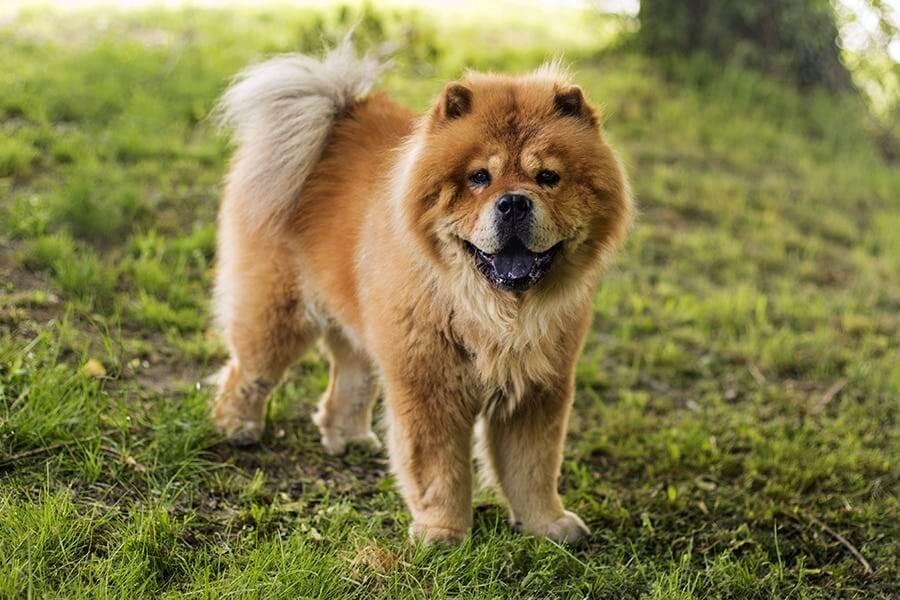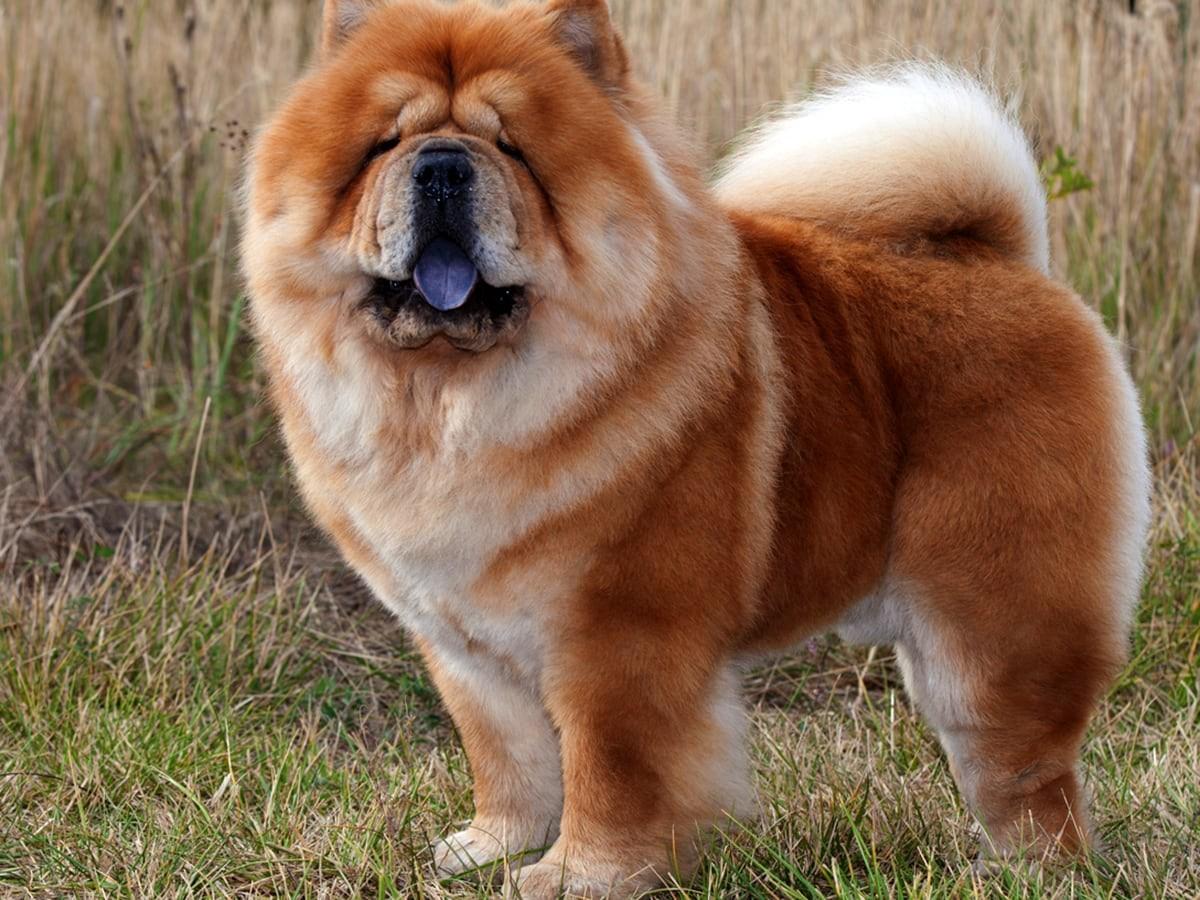Chow Chow Characteristics
Life expectancy: 11 – 13 years
Adult weight: 50 – 90 lbs.
Adult height: 18 – 22 in.
Origin – China
Chow Chows, with their distinctive lion-like mane and unique blue-black tongue, are undeniably captivating companions. But before welcoming one of these fluffy faces into your home, it's important to consider the cost of chow chow ownership.
This guide breaks down the expenses you can expect throughout your Chow Chow's life, including initial costs, ongoing monthly expenses, and potential veterinary care needs.

How Much Does a Chow Chow Cost?
Buying a Chow Chow Puppy: $1200 - $4,200
The price of a Chow Chow puppy can vary depending on factors like breeder reputation, pedigree, and location. Expect a range of $1200 to $2000 for a well-bred Chow Chow puppy. Champion bloodlines or rare coat colors like Panda Chows can cost even more.
Prices can vary depending on where in the U.S. you live. Here is a breakdown of costs by region:
Northeast: $1,500 and $4,000
South: $1,200 to $3,500
Midwest: $1,300 and $3,800
West: $1,400 and $4,200
Adopting a Chow Chow: $150 - $300
Looking for a more budget-friendly option? Consider adopting a Chow Chow from a shelter or rescue organization. Adoption fees typically range from $150 to $300 and may cover spaying or neutering and basic veterinary care.
Monthly Costs of Owning a Chow Chow
Dog Food: Chow Chows are big dogs with hearty appetites. High-quality dog food suitable for their size and activity level can cost around $90 to $100 per month.
Professional Grooming: Chow Chows have a thick double coat that requires regular brushing to prevent matting. Professional grooming services can cost $50 to $60 per session, with monthly sessions recommended. If you prefer DIY grooming, factor in the cost of brushes, shampoos, and nail clippers (around $80 to $150).
Veterinary Care: Regular checkups and preventative care are crucial for maintaining your Chow Chow's health. Budget $150 to $200 per month for vet visits, vaccinations, and parasite prevention medication.
Other Expenses
Pet Insurance: While not mandatory, pet insurance can help offset the cost of unexpected medical emergencies or illnesses. Premiums will vary depending on your pet's age, breed, and coverage plan.
Training and Supplies: Training classes, pet treats, dog toys, leashes and collars, and other supplies add to the overall cost of dog ownership.

The Average Lifespan of a Chow Chow
Chow Chows typically enjoy a lifespan of 11-13 years. Like all breeds, they are predisposed to certain health conditions. Early detection and preventative care through regular veterinary checkups can help manage these conditions and potentially reduce overall veterinary costs.
Common Health Conditions in Chow Chows
Chow Chows are a sturdy breed, but can be prone to several health issues that may require ongoing care. One common concern is eyelid entropion, where the eyelid folds inward and irritates the eye — often requiring surgical correction. According to Spot Pet Insurance data from 2025, the average claim cost for entropion is $920*.
Joint conditions such as hip and elbow dysplasia can also affect Chow Chows, leading to pain, stiffness, or lameness. The average claim cost for hip dysplasia is $652*, while elbow dysplasia averages $751*. Early diagnosis and maintaining a healthy weight can help manage these conditions.
Chow Chows may also suffer from skin allergies, which can cause itching and irritation. Identifying and managing triggers is key, with the average claim cost for skin conditions being $331* in 2025. Another common issue is hypothyroidism, an underactive thyroid that can lead to weight gain, lethargy, and coat problems; this condition is typically managed with medication.
While not every Chow Chow will develop these health concerns, regular veterinary visits and preventive care are essential for keeping them comfortable and healthy throughout their lives.
Lifetime Cost of Chow Chow Ownership: $20,000 - $25,000
Factoring in all the expenses mentioned above, the lifetime cost of Chow Chow ownership can range from $20,000 to $25,000. This is an estimate, and actual costs may vary depending on your location, chosen veterinarian, and any unforeseen medical needs your Chow Chow may encounter.
Expert Insights From Spot
According to Spot’s internal data, the claims most often submitted for Chow Chows are claims for heartworm and flea medications, rabies and Bordetella vaccinations, and special diets, foods, or supplements. Spot has received over 100 claims from pet parents of Chow Chows for heartworm and flea medications, and over 130 claims for Bordetella and rabies vaccinations. If you do decide to add a Chow Chow puppy to your family, we hope that this information will help give you an understanding of the kinds of veterinary services the breed may need during their life.
Key Takeaway
Chow Chows are loyal and majestic companions, but they also come with a significant financial responsibility. Carefully consider your budget and commitment before welcoming one of these special dogs into your life. Responsible pet ownership means providing your Chow Chow with a loving home, proper nutrition, veterinary care, and plenty of love and attention – for their entire lifespan.
How Can Spot Pet Insurance Help?
Spot accident & illness pet insurance plans offer a wide variety of coverages, from microchip implantation to surgeries and prescription food and supplements prescribed to treat your pet’s unexpected accidents and illnesses. (Prescription food and supplements used for general health or weight maintenance are not covered). For an extra cost, Spot Pet Insurance plans offer preventive care coverage add-ons to help cover the costs of certain routine vaccinations, annual wellness exams and other preventive care treatments. You can view the add-on preventive care coverage options. Get in touch with us to know more!

Creative manager by day, pet enthusiast all the time! After 19 years with my dog (hopefully he wins the award for oldest pet in the world), I enjoy spending my days brainstorming tail-wagging content, and sniffing out the latest trends in the pet world.
*Based on 2025 Spot Pet Insurance Services, LLC. Claims data
“Cost of a Chow Chow Puppy by US Region [2024].” IHeartDogs.com, 4 Jan. 2024, iheartdogs.com/cost-of-a-chow-chow-puppy-by-us-region/.












